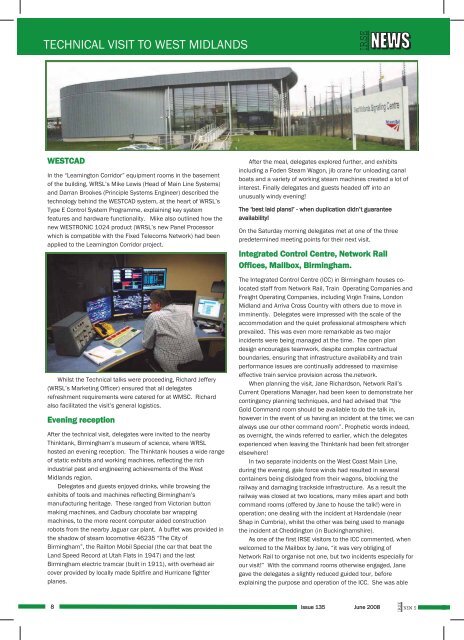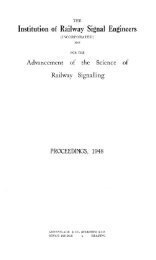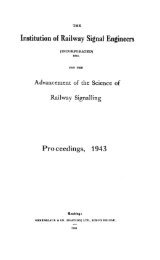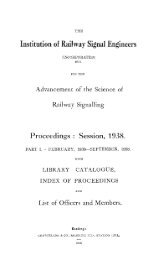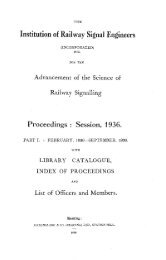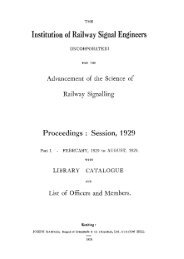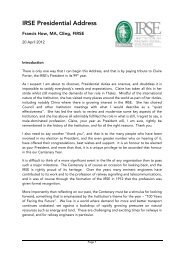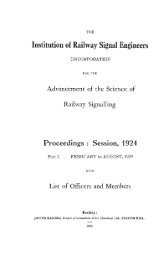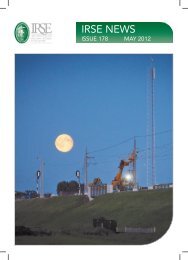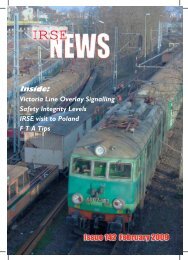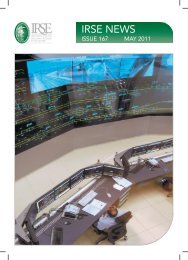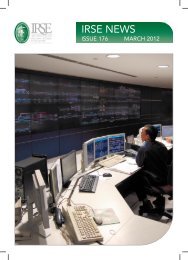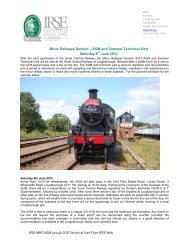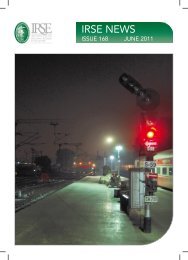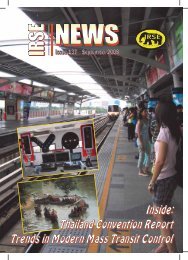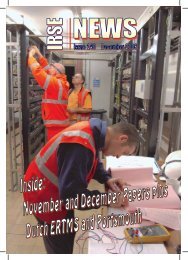IRSE News 135 Jun 08.pdf
IRSE News 135 Jun 08.pdf
IRSE News 135 Jun 08.pdf
Create successful ePaper yourself
Turn your PDF publications into a flip-book with our unique Google optimized e-Paper software.
TECHNICAL VISIT TO WEST MIDLANDS<br />
<strong>IRSE</strong><br />
WESTCAD<br />
In the “Leamington Corridor” equipment rooms in the basement<br />
of the building, WRSL’s Mike Lewis (Head of Main Line Systems)<br />
and Darran Brookes (Principle Systems Engineer) described the<br />
technology behind the WESTCAD system, at the heart of WRSL’s<br />
Type E Control System Programme, explaining key system<br />
features and hardware functionality. Mike also outlined how the<br />
new WESTRONIC 1024 product (WRSL’s new Panel Processor<br />
which is compatible with the Fixed Telecoms Network) had been<br />
applied to the Leamington Corridor project.<br />
Whilst the Technical talks were proceeding, Richard Jeffery<br />
(WRSL’s Marketing Officer) ensured that all delegates<br />
refreshment requirements were catered for at WMSC. Richard<br />
also facilitated the visit’s general logistics.<br />
Evening reception<br />
After the technical visit, delegates were invited to the nearby<br />
Thinktank, Birmingham’s museum of science, where WRSL<br />
hosted an evening reception. The Thinktank houses a wide range<br />
of static exhibits and working machines, reflecting the rich<br />
industrial past and engineering achievements of the West<br />
Midlands region.<br />
Delegates and guests enjoyed drinks, while browsing the<br />
exhibits of tools and machines reflecting Birmingham’s<br />
manufacturing heritage. These ranged from Victorian button<br />
making machines, and Cadbury chocolate bar wrapping<br />
machines, to the more recent computer aided construction<br />
robots from the nearby Jaguar car plant. A buffet was provided in<br />
the shadow of steam locomotive 46235 “The City of<br />
Birmingham”, the Railton Mobil Special (the car that beat the<br />
Land Speed Record at Utah Flats in 1947) and the last<br />
Birmingham electric tramcar (built in 1911), with overhead air<br />
cover provided by locally made Spitfire and Hurricane fighter<br />
planes.<br />
After the meal, delegates explored further, and exhibits<br />
including a Foden Steam Wagon, jib crane for unloading canal<br />
boats and a variety of working steam machines created a lot of<br />
interest. Finally delegates and guests headed off into an<br />
unusually windy evening!<br />
The ‘best laid plans!’ - when duplication didn’t guarantee<br />
availability!<br />
On the Saturday morning delegates met at one of the three<br />
predetermined meeting points for their next visit.<br />
Integrated Control Centre, Network Rail<br />
Offices, Mailbox, Birmingham.<br />
The Integrated Control Centre (ICC) in Birmingham houses colocated<br />
staff from Network Rail, Train Operating Companies and<br />
Freight Operating Companies, including Virgin Trains, London<br />
Midland and Arriva Cross Country with others due to move in<br />
imminently. Delegates were impressed with the scale of the<br />
accommodation and the quiet professional atmosphere which<br />
prevailed. This was even more remarkable as two major<br />
incidents were being managed at the time. The open plan<br />
design encourages teamwork, despite complex contractual<br />
boundaries, ensuring that infrastructure availability and train<br />
performance issues are continually addressed to maximise<br />
effective train service provision across the.network.<br />
When planning the visit, Jane Richardson, Network Rail’s<br />
Current Operations Manager, had been keen to demonstrate her<br />
contingency planning techniques, and had advised that “the<br />
Gold Command room should be available to do the talk in,<br />
however in the event of us having an incident at the time; we can<br />
always use our other command room”. Prophetic words indeed,<br />
as overnight, the winds referred to earlier, which the delegates<br />
experienced when leaving the Thinktank had been felt stronger<br />
elsewhere!<br />
In two separate incidents on the West Coast Main Line,<br />
during the evening, gale force winds had resulted in several<br />
containers being dislodged from their wagons, blocking the<br />
railway and damaging trackside infrastructure. As a result the<br />
railway was closed at two locations, many miles apart and both<br />
command rooms (offered by Jane to house the talk!) were in<br />
operation; one dealing with the incident at Hardendale (near<br />
Shap in Cumbria), whilst the other was being used to manage<br />
the incident at Cheddington (in Buckinghamshire).<br />
As one of the first <strong>IRSE</strong> visitors to the ICC commented, when<br />
welcomed to the Mailbox by Jane, “it was very obliging of<br />
Network Rail to organise not one, but two incidents especially for<br />
our visit!” With the command rooms otherwise engaged, Jane<br />
gave the delegates a slightly reduced guided tour, before<br />
explaining the purpose and operation of the ICC. She was able<br />
8<br />
Issue <strong>135</strong> <strong>Jun</strong>e 2008<br />
<strong>IRSE</strong><br />
NEWS


